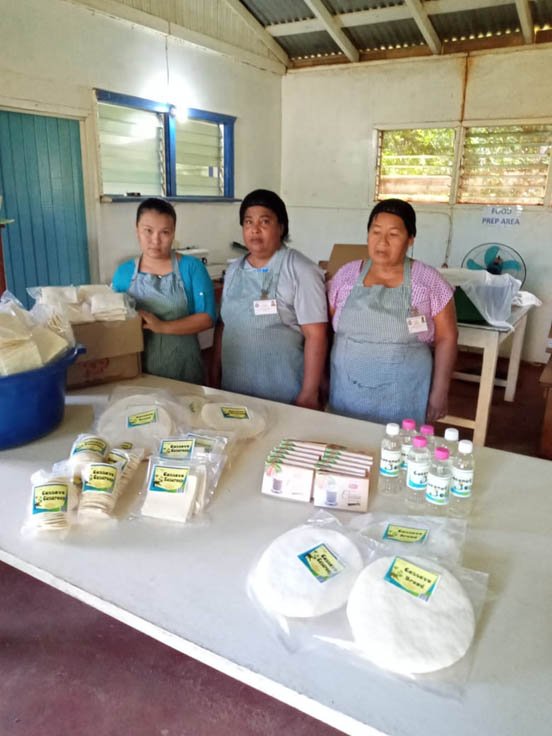The current trials of the fifteen year-old Hosororo Hill, Region One, Blue Flame Women’s Group is a typical example of the plight of many of the centres of economic activity in Guyana’s interior communities where a passion for entrepreneurship continues to be undermined by logistical blockages and official sloth in creating conditions more convivial to their growth.
Regarded for years as one of the more progressive economic ventures to emerge from the hinterland, Blue Flame’s survival now stands imperiled by the onslaught of COVID-19 which has ravaged an enterprise well-known for the mark that it has left on the country’s agro-processing sector.
This newspaper’s interview last weekend with Blue Flame’s chairperson, Christina James, left us in no doubt that the future of the 15-year-old farming and agro-processing entity, one of the most progressive organisations of its kind to emerge from the hinterland, probably hangs in the balance.
Concerns over the future of Blue Flame go beyond the current circumstances in which the entity finds itself. It is not just the fact that overnight, the entity has watched its earnings slump from around $300,000 per month to nothing, but the uncertainty as to when the pandemic will make the kind of decisive retreat that will allow the normal resumption of operations. The more time goes by before normal resumption, the greater the likelihood that market share could disappear. How long it will take for the transportation system that moves Blue Flame’s products from Hosororo to the city to return to normalcy and after that, to improve significantly, is hard to tell. What is clear is that the more than two hundred villagers whose livelihoods depend, either partially or fully on the entity’s returns from its sales cannot be expected to wait forever for answers.
Over time, Blue Flame has established a reputation for producing high-quality products including cocoa sticks, virgin coconut oil, cassava bread, seasonal fruit mix, and ground coffee, all of which are well-received in coastal markets. As of March, with Guyana in the grip of COVID-19, the movement of goods almost came to a shuddering halt. Reduced trading at coastal outlets, not least the Guyana Marketing Corporation’s Guyana Shop, one of the group’s key buyers in Georgetown, saw to that.
The current circumstances amount to a crisis for a proud organisation whose North West Organics label had made an impressive showing on the coast and had attracted the attention of high-profile supermarkets.
Setting aside the reduced trading by Blue Flame’s key retail outlets in Georgetown, COVID-19 has also impacted the movement of produce from the hinterland to the coast. The significantly reduced ferry services and restrictions placed on the movement of heavy goods vehicles continue to restrict the volumes of produce that can be moved to markets, even if the coastal outlets were working at ‘full steam.’
Nor is the option of moving their goods to market by air a viable one. At one hundred and fifty five dollars ($155.00) per pound, air freight costs are simply prohibitive. That leaves the group with the slow and sometimes risky option of moving their products from Hosororo to the Mabaruma ferry terminal by minibus, from where they are shipped to Georgetown for distribution to outlets. The ferry visits Mabaruma twice monthly.
The current setback could hardly have come at a worse time for the Blue Flame Group. Not only was the Group in the process of probing the expansion of its cocoa production. It was also seeking to further upgrade its labels and had been offered financial support in this regard by an international organisation.
James says that the COVID-19 pandemic is also likely to impact the group’s immediate-term pursuit of expanded markets in the region.
From all accounts however, the women of Hosororo have not allowed their heads to droop. They are currently using a shadehouse which they operate to cultivate various quick-selling cash crops including celery, eschallot, peppers and tomatoes. James says that last year the group made an application to the Small Business Bureau for a grant to build a second shadehouse.
There is no mistaking the threat that hangs over what has been one of the brighter stars in hinterland entrepreneurship. The question that remains to be answered is whether, given the lip service that has historically been paid to creating jobs and building viable enterprises in hinterland communities, the plight of Blue Flame serves as a sufficient incentive for both the state and the private sector bodies in Guyana to take genuine action that goes beyond lip service.
Businesses and support groups interested in supporting Blue Flame’s business pursuits can contact Ms. James on 678-6746.





